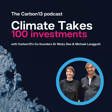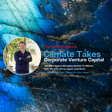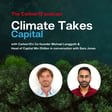
Climate Takes Venture Builders
Welcome to Carbon13's podcast "Climate Takes" where we ask founders, investors and builders for their "takes" on their industry and climate challenge, as well as setting a call to action, asking what will it take to solve the climate emergency?
On Climate Takes Venture Builders, we’re joined by two serial entrepreneurs who work within Carbon13: Puja Balachander and Nishul Saperia. Using their Founding and Venture Building experience, we take a look at the very model of Carbon13 itself.
Our conversation includes: What are venture builders, how do they differ to accelerators and venture studios, how do they work, and how do they make meaningful change in climate innovation?
Carbon13’s own Venture Builder has seen over 1000 founders pass through our programmes, resulting in nearly 80 invested ventures, collectively worth over £230million, with a potential to reduce emissions by 500 million tonnes per year.
Subscribe to Climate Takes to find more content on founding and investing in climatetech, with Takes on green chemicals, innovative materials, AI, and hard won lessons in climate entrepreneurship.










